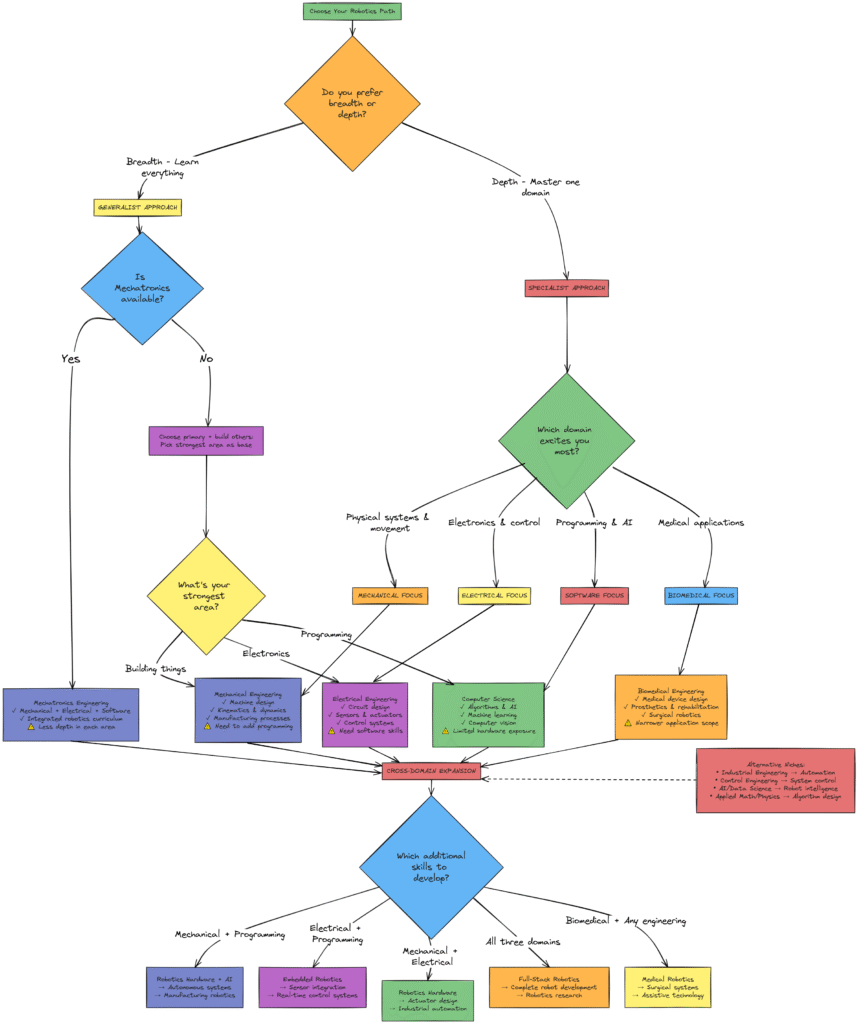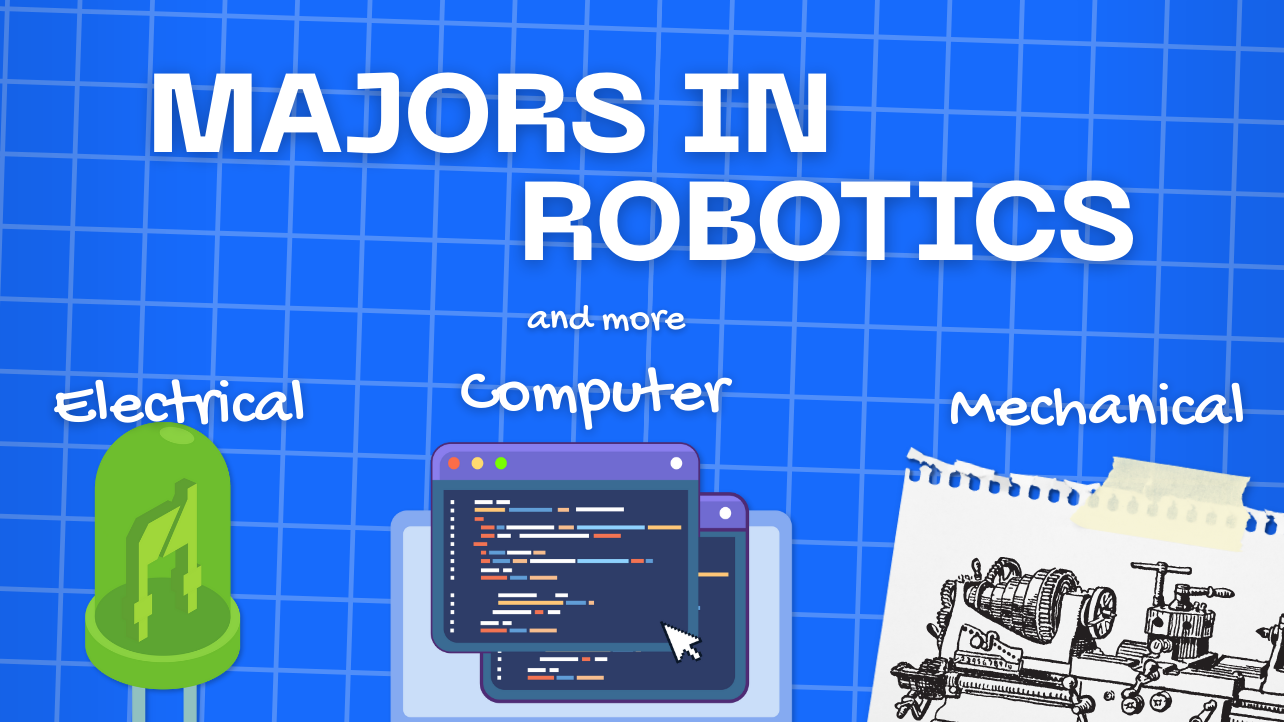Here’s the challenge: robotics is interdisciplinary. Unlike medicine or law, there isn’t one single “robotics major” that exists everywhere. Instead, students typically choose a traditional engineering or computer science major and build their path into robotics through projects, electives, and specializations.
If you’re a high school student or early undergraduate wondering “Which major should I pick to become a robotics engineer?”, this guide is for you. We’ll cover the most relevant majors, what their curriculums look like, their strengths and limitations, and the job opportunities they unlock as a side note. By the end, you’ll have a much clearer picture of how to shape your academic journey.
Why Robotics Requires Interdisciplinary Majors
A robot isn’t just hardware or just software, it’s both. Designing and building robots requires expertise across multiple domains:
- Mechanical engineering: structure, joints, kinematics, dynamics.
- Electrical engineering: circuits, sensors, actuators, power systems.
- Computer science: algorithms, perception, decision-making, AI.
- Automation & control: feedback loops, industrial processes.
- Biomedical engineering: medical devices and assistive technologies.
Because of this, robotics can be studied through many entry points. The question is whether you want to generalize (broad foundation, like mechatronics), or specialize (deep dive into one domain, like computer science or mechanical engineering).
The Core Majors for Robotics
Mechanical Engineering
If you like building things that move, mechanical engineering is a natural entry point into robotics. You’ll study subjects like mechanics, kinematics, CAD design (with SolidWorks or CATIA V5), and manufacturing. These give you the skills to design the body, joints, and motion systems of a robot.
In practice, mechanical engineers handle the structure and movement: robotic arms in factories, drone frames, or the chassis of autonomous vehicles. Most graduates end up in industries like automotive automation, aerospace robotics, and industrial manufacturing.
The strength of this major is its solid foundation in machine design. The trade-off is that you’ll need to pick up programming and electronics later if you want to work beyond the hardware.
Electrical Engineering
Robots cannot move without electricity, sensors, and control circuits, and that is where electrical engineering comes in. Students dive into circuits, embedded systems, power electronics, and sensors.
Electrical engineers in robotics focus on the nervous system of the robot: driving motors, reading sensor signals, and making sure hardware responds correctly to commands. This makes them essential in fields like automation, robotics hardware design, and sensor development.
If you enjoy working with electronics and control, this major gives you a strong position. However, like mechanical engineering, it requires extra effort in coding and software if you want to move into AI-driven robotics.
Computer Science / Software Engineering
If your strength is coding, computer science opens the path to the “brain” of robotics. You’ll study programming, algorithms, machine learning, and computer vision, all of which let robots perceive the world and make decisions.
Graduates often work on autonomous navigation, AI systems, and robot perception, whether in startups, research labs, or big tech companies. Computer science majors are highly valued in robotics because robots are becoming more intelligent every year.
The advantage is clear: strong software skills are always in demand. The drawback is that you may not touch much hardware unless you seek projects or electives that bring you closer to the machines.
Mechatronics Engineering
For students who do not want to choose between mechanics, electronics, and coding, mechatronics offers a blend of all three. The coursework covers mechanical design, embedded electronics, and control systems, often tied together with robotics projects.
This makes mechatronics one of the most direct pathways into robotics, especially in countries where it is offered as a “State Engineer” track. Many graduates find themselves well prepared for industrial robotics, automation companies, and prototyping labs.
A fact about myself, I’m currently studying mechatronics engineering (Robotics and Artificial Intelligence option) in the National School of Applied Sciences in Kenitra to become a State engineer in Morocco.
The upside is balance since you get exposure to everything. The downside is depth since you may not be as specialized as peers in mechanical or computer science. But for robotics, that broad integration can be a big advantage.
Biomedical Engineering
Robotics is not just about cars and factories. It is also transforming healthcare. Biomedical engineering combines engineering with medical sciences, covering biomechanics, prosthetics, and medical device design.
In robotics, biomedical engineers develop surgical robots, prosthetic limbs, and rehabilitation devices. The field is smaller than mechanical or computer science, but highly impactful for students interested in both medicine and technology.
Robotics Engineering (Specialized Programs)
A few universities now offer robotics engineering as a dedicated degree. These programs combine mechanical, electrical, and computer science with courses in automation and AI.
If you can get into one, it is the most direct and specialized way to study robotics from day one. However, since not every university offers it, many students still choose broader majors first and specialize later through a master’s program.
Alternative and Complementary Majors
Not every robotics professional comes from engineering. Here are other paths that can still lead to robotics:
- Industrial Engineering: Focus on production systems and automation.
- Automation & Control Engineering: Deep dive into system control, often overlapping with robotics.
- AI & Data Science: Ideal for perception, computer vision, and machine learning in robotics.
- Applied Mathematics & Physics: Strong base for research and algorithm design.
Often, students in these majors pursue a robotics-focused master’s degree afterward.
Bachelor vs Master’s Path
Your bachelor’s degree gives you the broad foundation. Your master’s degree (or later specialization) shapes your robotics expertise.
- Bachelor’s examples:
- Mechanical Engineering → builds solid hardware knowledge.
- Computer Science → sharpens programming and AI skills.
- Mechatronics → exposes you to all components.
- Master’s options:
- Robotics Engineering
- Artificial Intelligence in Robotics
- Autonomous Systems
In many countries, especially in Europe and Africa, students pursue a State Engineer track. This is similar to a master’s in scope and allows them to specialize in robotics, mechatronics, or automation.
How to Decide Your Major
Choosing a major is less about “the best one” and more about your interests and strengths. Ask yourself:
- Do you enjoy building and designing machines? → Mechanical.
- Do you like electronics and circuits? → Electrical.
- Are you excited about coding and AI? → Computer Science.
- Do you want a blend of all three? → Mechatronics.
- Are you passionate about healthcare technology? → Biomedical.
Also consider whether you prefer to be a specialist (deep in one area), or a generalist (broad across areas). Both paths work, as robotics teams need both.
Most importantly: your projects, internships, club activities and competitions matter as much as your degree. A computer science student who builds robots will be just as competitive as a mechatronics student.
Here’s a flowchart to help you visually decide which major you want to hope on:

In case of the unclarity of the image, you can either check out:
- The link of the full flowchart (with the ability to edit).
- The full image.


No comments yet